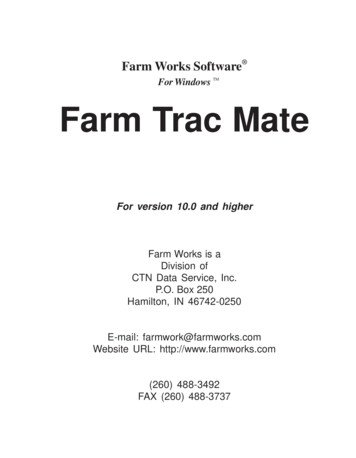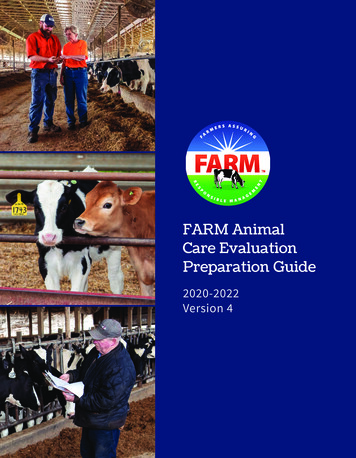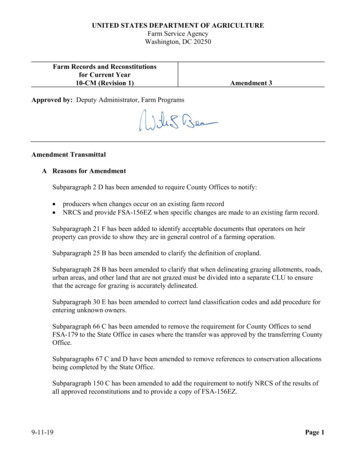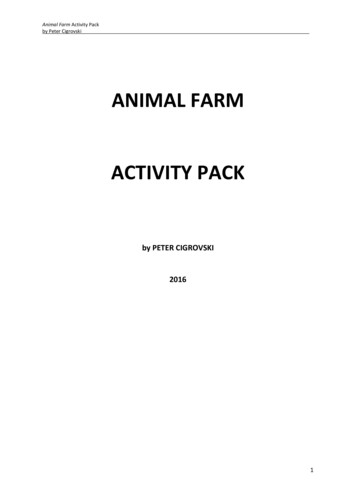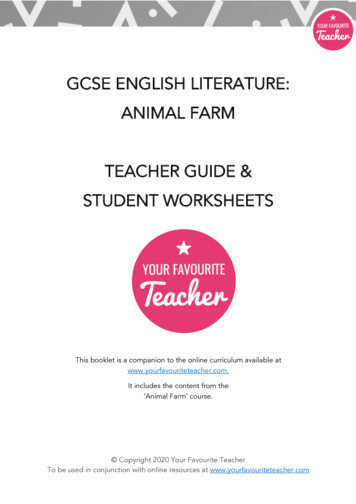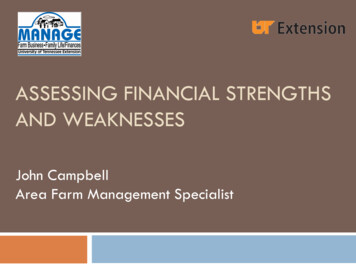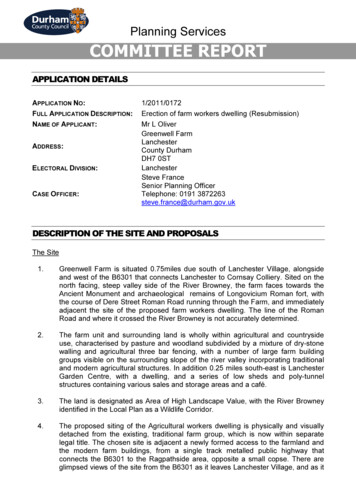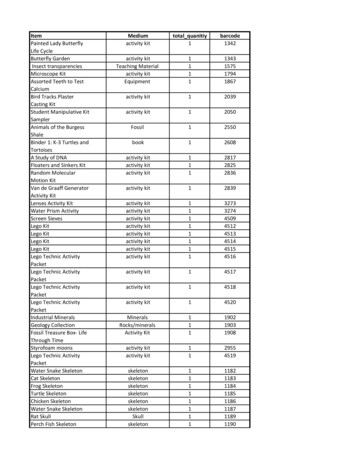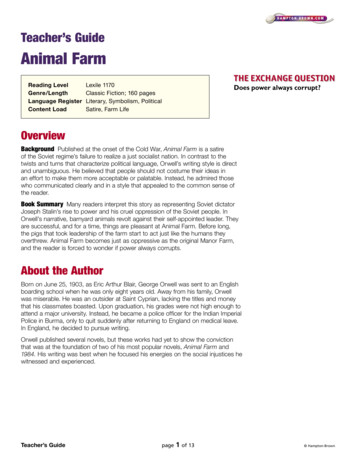
Transcription
Teacher’s GuideAnimal FarmTHE EXCHANGE QUESTIONReading LevelGenre/LengthLanguage RegisterContent LoadLexile 1170Classic Fiction; 160 pagesLiterary, Symbolism, PoliticalSatire, Farm LifeDoes power always corrupt?OverviewBackground Published at the onset of the Cold War, Animal Farm is a satireof the Soviet regime’s failure to realize a just socialist nation. In contrast to thetwists and turns that characterize political language, Orwell’s writing style is directand unambiguous. He believed that people should not costume their ideas inan effort to make them more acceptable or palatable. Instead, he admired thosewho communicated clearly and in a style that appealed to the common sense ofthe reader.Book Summary Many readers interpret this story as representing Soviet dictatorJoseph Stalin’s rise to power and his cruel oppression of the Soviet people. InOrwell’s narrative, barnyard animals revolt against their self-appointed leader. Theyare successful, and for a time, things are pleasant at Animal Farm. Before long,the pigs that took leadership of the farm start to act just like the humans theyoverthrew. Animal Farm becomes just as oppressive as the original Manor Farm,and the reader is forced to wonder if power always corrupts.About the AuthorBorn on June 25, 1903, as Eric Arthur Blair, George Orwell was sent to an Englishboarding school when he was only eight years old. Away from his family, Orwellwas miserable. He was an outsider at Saint Cyprian, lacking the titles and moneythat his classmates boasted. Upon graduation, his grades were not high enough toattend a major university. Instead, he became a police officer for the Indian ImperialPolice in Burma, only to quit suddenly after returning to England on medical leave.In England, he decided to pursue writing.Orwell published several novels, but these works had yet to show the convictionthat was at the foundation of two of his most popular novels, Animal Farm and1984. His writing was best when he focused his energies on the social injustices hewitnessed and experienced.Teacher’s Guidepage1 of 13 Hampton-Brown
Animal FarmReading the BookStudent Journal, page 1Name:There are several options for reading Animal Farm.They include:Student Journal Whole Class Assign sections of the book and discussion datesusing the planner on Student Journal, page 1. After studentsread a section and respond to the corresponding StudentJournal pages, have a class discussion. At the end of the book,the class meets for The Exchange.Animal Farmby George OrwellReading ScheduleGroup members: Small Groups Read the book Introduction with the group.Group members then read an agreed-upon number of pages,complete the corresponding Student Journal pages, and meetto discuss. When they finish the book, they meet again for TheExchange. Use the planner on Student Journal, page 1 toestablish meeting times.Animal FarmStudent JournalIntroductionPages 2–4Chapters I–IVPages 5–6Chapters V–VIIPages 7–8Chapters VIII–XPages 9–10Due DateDiscussion DateThe ExchangeAssessment Independently Students read the book on their own andthen meet as a group for The Exchange. Use the planner onStudent Journal, page 1 to establish the meeting time. Guided Reading Have students read Student Journal,page 2 and monitor their discussion of the What If? scenario.Read aloud the book Introduction to give students backgroundon the book. As students read, use the Before You Move Onquestions to guide comprehension. Use the Look Ahead to seta focus for reading the next set of pages. At the end of eachsection, assign the appropriate Student Journal pages. Discussthe pages before starting the next section. Establish a date forThe Exchange and record it on the planner.Does poweralways corrupt?HSLL.T3.SJ.Animal.indd 19/28/06 10:43:27 AMStudent Journal, page 2Animal FarmGetting StartedWhat If?You and your friend have part-time jobs at a store in the mall. You bothlove the store, but the manager is unfair and yells at the workers. If youare late even five minutes, he takes money out of your paycheck. Youare allowed only one 15-minute break.Getting StartedHave students read What If? on Student Journal, page 2and discuss the scenario. Encourage students to describe thesimilarities and differences between the scenario and their lives andimagine how the situation would affect them. Have students write their responses to the three questions belowthe scenario and compare answers with a partner or the group. Have students discuss how the situation might relate to TheExchange question and then write a brief summary of theirdiscussion in the Student Journal.Then your friend becomes assistant manager. You are both happybecause now he can make things better at work. At first, he treats theworkers well. However, one day you notice your friend noting your breaktime. The next day, he asks if you can work a little faster. By the end ofthe week, he’s yelling at you just like the manager did.Make notes about how this would affect you. What could have made your friend change? Would this affect your friendship? Do you think you would change if you became a manager?Connect to The Exchange Question Discuss how this situationcould relate to The Exchange Question: Does power always corrupt?Summarize your discussion.HSLL.T3.SJ.Animal.indd 2Teacher’s Guidepage2 of 139/28/06 10:43:31 AM Hampton-Brown
Animal FarmIntroductionStudent Journal, page 3Animal FarmHave students read the book Introduction. Check theircomprehension with the three follow-up questions on StudentJournal, page 3.IntroductionRead the Introduction on pages 7–9 in Animal Farm. The Introduction willhelp you understand key concepts in the book. Knowing them will helpyou discuss and write about the book.The Introduction includes information about how the author’s experiences influenced his writing the historical events of the book’s time period reactions to the bookAfter you read the Introduction, answer these questions to check yourunderstanding.1. How did the author’s own experiences influence the plot of the book?At boarding school, Orwell was ridiculed because he didnot have an important family name or status. These earlyexperiences inspired him to explore social inequality andthe misuse of power.2. What was happening in the former Soviet Union when this book waspublished? How does the book address this?Joseph Stalin had risen to power and become the dictatorof the Soviet Union. He established an oppressive regimein which the Soviet people suffered from political injusticesand a poor economy. Orwell’s book satirizes dictators.3. How did people react to Animal Farm?Animal Farm was very controversial when it was firstcompleted in 1946. Many people felt the novel attacked theSoviet Union and its leader too directly. After being in printfor a few years the book started to gain popularity.HSLL.T3.SJ.Animal.indd 39/28/06 10:43:31 AMStudent Journal, page 4Introduction: Key ConceptsAnimal FarmHave students study the first Key Concept with the help of thegraphic organizer on Student Journal, page 4. After studying theexample, they should create similar graphic organizers to focustheir understanding of the remaining Key Concepts.Introduction: Key ConceptsConcept MapStudy the Concept Map for injustice. Write a sentence using theword injustice.Key utionConcept MapKey ConceptinjusticeCharacteristics of concept:wrongviolationslossNot characteristic of concept:equalityfreedomhonestyDefinition of conceptwhen things are notjust or fairExamples of conceptdiscriminationbeing punished for a crime you did not commitOn a separate sheet of paper, create a similar Concept Map forthe remaining Key Concept words. Write what the word is like(Characteristics) and what the word is not like. Use a dictionary fora definition of the word and to help you with examples. Then write asentence for each Key Concept word.HSLL.T3.SJ.Animal.indd 4Teacher’s Guidepage3 of 139/28/06 10:43:32 AM Hampton-Brown
Animal FarmPages 11–56Answers for Before You Move OnChapters I–IVStudent Journal, page 5Animal FarmPAGE 231. Conflict According to Major, why is Man the enemy?Man is the enemy because he does not give animals freedomto live off what they produce, and he works them until theyare no longer useful.Respond to Chapters I–IV1. Personal Response Old Major inspires the animals to start arevolution against their cruel master, Mr. Jones. Describe a personwho inspires you.2. Summarize What is the main message Major gives to theother animals on the farm?Animals should rebel against the tyranny of Man and treat allanimals as comrades in a unified struggle.2. Opinion Do you think that the Seven Commandments of Animalismmake Manor Farm a more democratic place? Why or why not? Use theword democratic in your response.Students may say yes, because the rules establish that allanimals are equal, and that is the basis of a democracy.They may say no because the rules dictate who is afriend and who is an enemy, which undemocratically takesaway personal choice.3. Plot The other animals discover that the pigs are keeping the milk andfruit for themselves. What is the significance of this event to the plot?PAGE 361. Cause and Effect Reread pages 27–29. What events triggerthe Rebellion?Jones forgets to feed the animals for almost two days. Sothe animals steal food and get whipped. They decide tofight Jones.2. Inference Why are the pigs more interested in the Rebellionthan other animals?As the more intelligent animals, they see the power it couldbring them.This is the first sign of corruption of power in the pigs. Oneof the most important rules of Animalism is that all animalsare equal. The pigs are disobeying this rule and acting likethey are more important than the other animals.4. Generate Questions Write a question about this section for someoneelse reading this book. Exchange questions with them. Do you agreewith their answer?Student Journal, page 6HSLL.T3.SJ.Animal.indd 59/28/06 10:43:32 AMAnimal FarmPAGE 561. Plot Why do the animals accept the pigs getting all the milk?The pigs convince the animals that they should get themilk because they do all of the brain work and without themMr. Jones could return.2. Conclusions Why do the other farmers help Mr. Jones whenhe tries to reclaim his farm?They see how successful the animal revolution is and areafraid that their animals will do the same.Respond to Chapters I–IV, continued5. Analyze Character In Chapters I–IV, Snowball, Squealer, andNapoleon provide leadership to the other animals. List what Snowball,Squealer, and Napoleon do and what this shows about them.Character Description ChartCharacterSnowballSquealerNapoleonWhat theCharacter DoesWhat This ShowsAbout the Characterleads the animals’ Snowball is a strategistrevolt; createsand an inventor. Heplans to build the wants to make thewindmillfarm better.Squealer is a follower.communicatesNapoleon’s rules; He serves Napoleonand that gives himtells Napoleonpower.about anysuspicious behaviormakes all theNapoleon isdecisions on themanipulative andfarm; gets rid offierce. He is a ruthlessany animal thatdictator.objects to himNapoleon is named after a French dictator, so this character nameis very appropriate. Based on what you know about Squealer andSnowball, how do their names fit them?His name, Snowball, suggests that he is not a harmfulanimal. As Squealer’s name indicates, he is a squealer. Hesnitches on animals. He also delivers all of Napoleon’s lies.HSLL.T3.SJ.Animal.indd 6Teacher’s Guidepage4 of 139/28/06 10:43:32 AM Hampton-Brown
Animal FarmPages 57–103Answers for Before You Move OnChapters V–VIIStudent Journal, page 7Animal FarmPAGE 711. Character’s Motive What makes Mollie go back to workingfor Man?Mollie does not want to give up enjoying small luxuries. Sheleaves Animal Farm in exchange for attention from Man.2. Inference Napoleon debates against all of Snowball’s plansfor the farm, but has no plans of his own. Why?He is biding his time until the dogs are trained, and he cantake over.PAGE 851. Comparisons Napoleon breaks some commandments.How does Animal Farm begin to resemble Manor Farmagain?The animals are forced to work for rations, give food tohumans, and engage in trade. They are motivated by fear andobedience. Not everyone is equal.Respond to Chapters V–VII1. Personal Response The animals work hard to build the windmilland finish a job they thought was impossible. Tell about a time yousuccessfully completed what you thought was impossible because ofhelp from others.2. Irony Napoleon announces that working on Sunday afternoon isvoluntary. But if animals don’t work, Napoleon will reduce their food rationby half. Explain why this is ironic. Use the word dictator in your response.The animals do not have a choice about working onSunday afternoons. If they choose not to work, they willstarve. Napoleon is a dictator because he leaves theanimals no freedom to choose.3. Argument Clover is heartbroken over what has been happening onthe farm. Why does she still insist then that the farm is better now thanit was under Mr. Jones?Clover does not want to admit that the farm is worsebecause she would have to acknowledge that she and theother animals have failed to realize Old Major’s vision. Shestill believes in what the farm was originally trying to do.4. Generate Questions Write a question about this section for someoneelse reading this book. Exchange questions with them. Do you agreewith their answer?2. Character’s Motive Why does Boxer work so hard andrepeat his slogans?The only thing he can control is how much he works. He feelsthat getting things done will solve problems.Student Journal, page 8HSLL.T3.SJ.Animal.indd 79/28/06 10:43:33 AMAnimal FarmRespond to Chapters V–VII, continuedPAGE 1031. Character’s Motive The animals are unhappy. What doesNapoleon gain by turning Snowball into the enemy?Napoleon unites the animals by creating a common enemy.This allows him to stop complaints about food shortages,cruelty, and overwork.2. Mood How does the mood of the story change after theexecutions?The animals are no longer happy and free. They can’t believewhat the Rebellion has turned into. They will remain faithfulbut have lost their spirit.5. Cause and Effect In Chapters V–VII Napoleon takes control ofAnimal Farm. Write 5 Causes and Effects to show how this happens.Use the Cause and Effect Chart to answer the question.Cause and Effect ChartCausesEffectsNapoleon brings in thedogs and they attackSnowball.Squealer explainseverything to the animals.Napoleon wins the debateover the windmill andinstills fear in the animals.Napoleon is able to changethe commandments onthe farm and the animalsaccept the changes.The animals believe thatSnowball is a traitor, andNapoleon is a hero.The animals allow the pigsto have unfair advantages.They do not know what theoriginal commandmentssaid and if they reallyhave changed.Squealer changes thetruth about things thatSnowball did.The animals fear Jonescoming back.Most of the animalscannot read.How does the ignorance of the other animals help Napoleongain power?Most of the animals cannot read so they are forced to trustNapoleon and Squealer. The other animals are too afraidof the dogs to speak up against Napoleon. They believeeverything they hear.HSLL.T3.SJ.Animal.indd 8Teacher’s Guidepage5 of 139/28/06 10:43:33 AM Hampton-Brown
Animal FarmPages 104–158Answers for Before You Move OnChapters VIII–XStudent Journal, page 9Animal FarmPAGE 1241. Character’s Motive Why does Napoleon rarely appearin public?It makes him seem more powerful and important. He doesnot mix with the common masses.2. Inference Reread page 105. Why do the animals barelyremember life before the Rebellion?Squealer fills them with so much information and lies thatthey don’t know what really happened.PAGE 1411. Character’s Motive Why does Benjamin read the side ofthe van when he refused to read for the animals before?He is now affected by Napoleon because Napoleon hurtsomeone he was devoted to.Respond to Chapters VIII–X1. Personal Response Clover and Benjamin prove to be loyal andreliable friends to Boxer. Which animal would you choose for a friend?Explain why the animal’s qualities would make them a good friend.2. Conclusions What is Sugarcandy Mountain? Do you think it is a fairreward for the animals that have experienced injustice and inequality intheir lives? Why? Use the words injustice and inequality in your response.Sugarcandy Mountain is not a fair reward for a lifetime ofinjustice and inequality because it is an imaginary place thatdoesn’t really exist.3. Author’s Purpose At the end of the story the animals notice that theycannot distinguish the pigs from the men. What message do you thinkthe author is trying to convey in this scene?That power can corrupt anyone. The pigs were controlledby Man, and despite the animals’ revolution, they are nowjust as corrupt as Man.What If?4. Connect Look at your notes on Student Journal, page 2. Think about being in asituation where you work for people who are corrupted by power. Compare thisto Animal Farm. What happens to the animals when Napoleon takes control ofAnimal Farm?2. Inference Reread pages 129–130. Why do the pigs insist onmore ceremonies and songs in the animals’ daily routine?Ceremonies and songs offset the hardships of the farm andmotivate the animals to continue working.Student Journal, page 10HSLL.T3.SJ.Animal.indd 99/28/06 10:43:33 AMPAGE 1581. Irony Reread page 146. What is the irony of the outcome ofAnimal Farm?The animals are proud that they are the only farm run byanimals and not Man, but the animals on Animal Farm aretreated worse by the pigs than they were by Man.2. Paraphrase Reread page 150. What does “All animalsare equal but some animals are more equal than others”really mean?The statement implies that all animals are not equal; someare better than others, or at least they think they are.Animal FarmRespond to Chapters VIII–X, continued5. Plot In Chapters VIII–X, Animal Farm becomes very different from OldMajor’s initial vision. How do the dogs and Squealer boost Napoleon’spower and allow him to remain in power? Use the T Chart to answerthe question.T ChartHow the dogs boostedNapoleon’s powerThey scared all of the otheranimals.They killed for Napoleon.They ran snowball off thefarm.How Squealer boostedNapoleon’s powerHe spread lies.He convinced the animalsto believe Napoleon.He told Napoleoneverything that washappening.Could Napoleon have been a successful dictator if he did not haveSquealer and the dogs? Why or why not?No,he would not have been able to rule Animal Farmwithoutthe dogs or Squealer. Napoleon did not have a lotofhis own innovative ideas. The dogs helped Napoleonintimidatethe other animals and they protected him. Theyinstilledfear in the rest of the animals.HSLL.T3.SJ.Animal.indd 10Teacher’s Guidepage6 of 139/28/06 10:43:33 AM Hampton-Brown
Animal FarmExchange DiscussionAnimal Farm, inside back coverTHE QUESTIONDoes power always corrupt?Review the work you did in your Student Journal. Takeyour book and your Journal with you to The Exchangebook discussion. Was everyone in this book corrupted by power? Explain.No. The characters in the book with power are the humans,Napoleon, and Snowball. The humans and Napoleon are corruptedby power because they use their power to gain things for themselves.Snowball is not corrupted by power because he acts for the good ofthe group.EXCHANGE IDEAS Tell the group why you would recommend or notrecommend this book. Compare this book to something it reminded youof, such as another book, a movie, a TV show, ora personal experience. Has this book changed or confirmed the way youthink about something in your life? Explain.THE QUESTIONDoes power always corrupt? Tell about a time when you had to decide if you should keepquiet or revolt against something you felt was wrong. Was everyone in this book corrupted by power?Explain. Tell about a time when you had to decide if youshould keep quiet or revolt against something youfelt was wrong. The animals all react differently to Napoleon andhis dictatorship. Which animal do you feel bestrepresents what you would do under these injustices?Explain your reasons. The animals all react differently to Napoleon and hisdictatorship. Which animal do you feel best represents what youwould do under these injustices? Explain your reasons.REFLECTSummarize your Exchange. How did this book change theway you see something? What questions do you still have?How will you answer them?Discussion RubricEvaluate the DiscussionEvaluate the DiscussionExcellentUse the reproducible master from page 8 of this Teacher’s Guideto evaluate The Exchange discussion. The form may also be usedby students for group assessment.GoodFairEveryone participated.Most people participated.Only a few peopleparticipated.Everyone spoke clearly.Most people spoke clearly.Some people did not speakclearly.Everyone listenedcarefully.Most people listenedcarefully.Some people did not listencarefully.We stayed on the topicthroughout the discussion.We stayed on the topicmost of the time.We did not stay on thetopic all the time.We responded to eachother’s thoughts and ideasoften.We commented on eachother’s thoughts and ideassometimes.We did not make manycomments on each other’sthoughts and ideas.Most people usedexamples from the book tosupport their points.Many people usedexamples from the bookto support their points.Only a few people usedexamples from the bookto support their points.Most people gave detailedanswers using theirexperiences and evenother texts.Many people gave detailedanswers using theirexperiences.Only a few people gavedetailed answers.Notes:Teacher’s Guidepage7 of 13 Hampton-Brown
Book TitleDateEvaluate the DiscussionExcellentGoodFairEveryone participated.Most people participated.Only a few peopleparticipated.Everyone spoke clearly.Most people spoke clearly.Some people did not speakclearly.Everyone listened carefully.Most people listenedcarefully.Some people did not listencarefully.We stayed on the topicthroughout the discussion.We stayed on the topicmost of the time.We did not stay on thetopic all the time.We responded to eachother’s thoughts and ideasoften.We commented on eachother’s thoughts and ideassometimes.We did not make manycomments on each other’sthoughts and ideas.Most people used examplesfrom the book to supporttheir points.Many people usedexamples from the bookto support their points.Only a few people usedexamples from the bookto support their points.Most people gave detailedanswers using theirexperiences and even othertexts.Many people gave detailedanswers using theirexperiences.Only a few people gavedetailed answers.Notes: Hampton-Brown
Animal FarmAssessmentAssessment Part IName:Animal FarmAssess students’ understanding of Animal Farm by administeringthe multiple-choice test and essay questions. (Teacher’s Guide,pages 10–12)How you administer the Assessment depends on your objective.You may choose to use the test as: an open-book test to allow students to continue practicingreading strategies and/or become familiar with a typicalstandardized test formatAssessment Part ICircle the best answer.4. What can the reader conclude about Mollie?1. Which of these is the best plot summary?A Mollie leaves Animal Farm because sheA When the animals successfully revolt,they realize that living by their own rules isbetter than working under Mr. Jones.B When the animals have an opportunity torule their own farm, they realize that theycan become equally corrupt as humanbeings when one animal takes over.provides her with small luxuries that makeher happy.C After the animals gain control of thefarm, the pigs start acting like humans.Boxer works really hard. Mollie goes backto work for Man.incapable of building the windmill.A revolutionC He does not think the animals will surviveB clublong without their old master, Mr. Jones.C dictatorshipD He cannot determine which will helpD teamfood and slaughters anyone who violates therules. These are examples of.Assessment Part I: 5 points per question for a total of 50 points.Assessment Part II: 40 points possible (see Scoring Guide,page 13)and what changes are made, life will notimprove.B He does not think that the animals are3. Napoleon does not give the animals enoughSuggested point values are as follows:because she does not value freedom.A He thinks that no matter who is in chargeorder to gain control of the farm. a take-home test to allow students to practice reading strategiesas well as test-taking skillsD Mollie chooses to leave Animal Farm5. Why does Benjamin decide against votingfor either Snowball’s windmill or Napoleon’smanger?to govern their own farm, they builda windmill. When it is destroyed theyblame Man.2. The animals of Manor Farm started afeels she is overworked.C Mollie chooses a different master whoD When barnyard animals obtain power a closed-book test to check students’ comprehension of thebook and their abilities in various reading skillsdoes not get along with the other animals.B Mollie leaves Animal Farm because shethe animals more, the windmill or a fullmanger.6. After Napoleon executes the animals, theauthor creates a mood of—A humanityA angerB injusticesB excitementC revolutionsC happinessD rebellionsD disappointmentAssessment Part IIAssessment Part I, continuedAnimal FarmName:Animal FarmAssessment Part I, continuedGuidelines for Short EssayHave students write a short essay in response to one of the writing promptsbelow. Use the Scoring Guide to assist in your evaluation of their essays.Circle the best answer.7. The animals are struggling with theA. Old Major states that Man is the enemy and encourages a revolution. Whatdid Old Major fail to foresee? How was his vision of Animal Farm differentfrom Napoleon’s? Knowing what you do now, how would you advise theanimals on the farm?disappointment that life has not becomebetter under Napoleon. Which sentence fromthe book suggests this?A The animals were not badly off throughoutResponses should address how power, whether in the hands of humans or animals,can corrupt. Old Major’s vision failed because he could not foresee that animals, whenplaced in a position of absolute power, could become just as corrupt and evil as people.Students may write that given what they know now, they would advise the animals to createcommandments that would balance the power among different animals.that summer, in spite of the hardnessof their work.B As for the others, their life, so far as theyknew, was as it had always been.B. How does Napoleon gain and keep control of Animal Farm? How do theanimals react to his leadership? What could the animals have done tostop Napoleon?C Once again the animals were consciousof a vague uneasiness.Responses should address how Napoleon gained control by using the dogs to instill fearin the animals and run Snowball out of Animal Farm. He kept control by using the dogs,Squealer, and the sheep to spread his lies and interrupt when there was uneasinessabout a decision. The animals let their fear and ignorance control them. They could havequestioned Napoleon’s rules and joined together to revolt against him.D But if there were hardships to be borne,they were partly offset by the fact that lifenowadays had a greater dignity than ithad had before.Scoring Guide8. On page 115, why does Squealer use theword readjustment instead of reduction whentalking about the animals’ food ration?Description of the response: Interpretation is accurate and thoughtfulExplanation is fully developedSupport includes specific and relevant text evidenceAll parts of the question are clearly addressed Interpretation is adequateExplanation is developed but may lack some insightSupport includes most specific and relevant text evidenceAll parts of the question are addressed to some degree2 Interpretation is literal or limitedExplanation is incompleteSupport includes some specific and relevant text evidenceOnly parts of the question are addressed and mostly in a limited way1 Interpretation is weakExplanation is vagueSupport includes few, if any, relevant details from the textOnly one part of the question is minimally addressed0Response is totally incorrect or irrelevant43Teacher’s GuideA Squealer does not want to admit thatthere is a food shortage.B Squealer believes that the animals do notneed as much food as they demand.C Squealer does not know how to read sohe uses the wrong word when talkingabout the ration.9. In what way does Snowball feel connected tothe windmill?A Snowball feels that it is his opportunityto contribute something important toAnimal Farm.B Snowball is certain that building thewindmill will allow the other animals tosee him as their leader.C Snowball feels that a windmill should beon every farm.D Snowball cannot wait to build the windmillbecause he knows that Napoleon isagainst it.10. Near the end of the story, the animals cannottell the difference between the pigs and men.This helps the reader understand—A that conditions on Animal Farm willprobably get betterB that Man will be in charge of AnimalFarm againC that animals and men both have becomecorrupted by powerD that animals and men can never be equalsD Napoleon has given Squealer specificinstructions about what words to use.page9 of 13 Hampton-Brown
Name:Animal FarmAssessment Part ICircle the best answer.4. What can the reader conclude about Mollie?1. Which of these is the best plot summary?A Mollie leaves Animal Farm because sheA When the animals successfully revolt,they realize that living by their own rules isbetter than working under Mr. Jones.B When the animals have an opportunity torule their own farm, they realize that theycan become equally corrupt as humanbeings when one animal takes over.B Mollie leaves Animal Farm because shefeels she is overworked.C Mollie chooses a different master whoprovides her with small luxuries that makeher happy.C After the animals gain control of
and a poor economy. Orwell's book satirizes dictators. Animal Farm was very controversial when it was first completed in 1946. Many people felt the novel attacked the Soviet Union and its leader too directly. After being in print for a few years the book started to gain popularity. HSLL.T3.SJ.Animal.indd 3 9/28/06 10:43:31 AM Animal Farm
